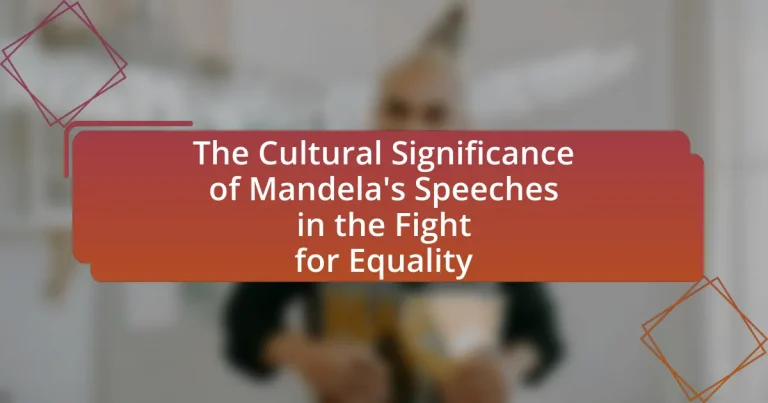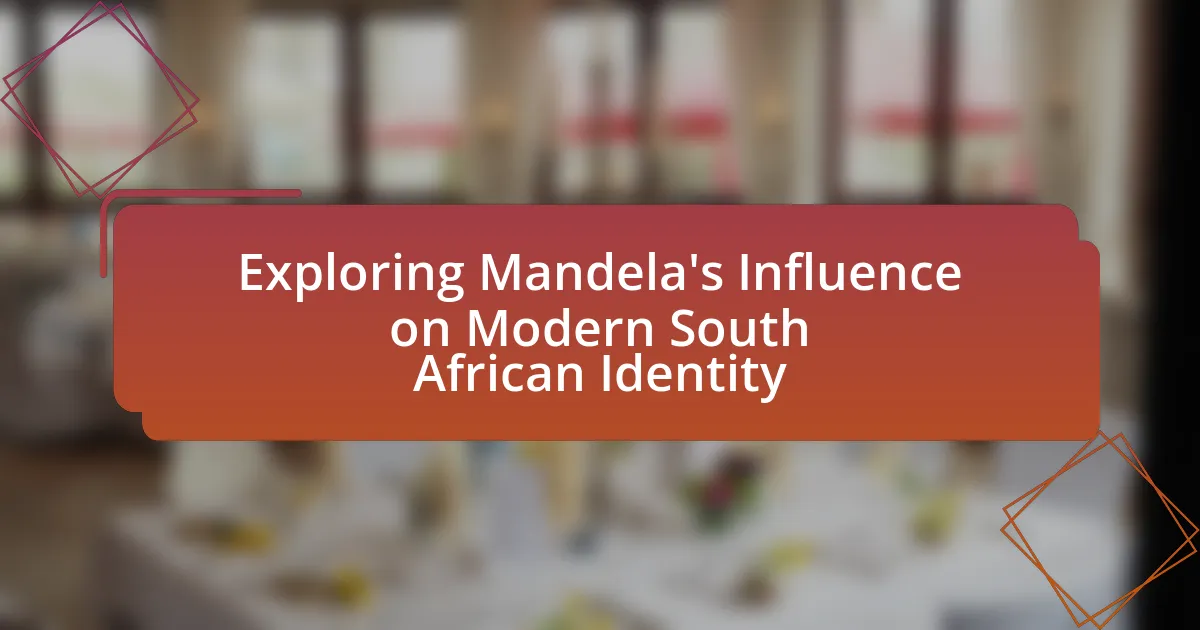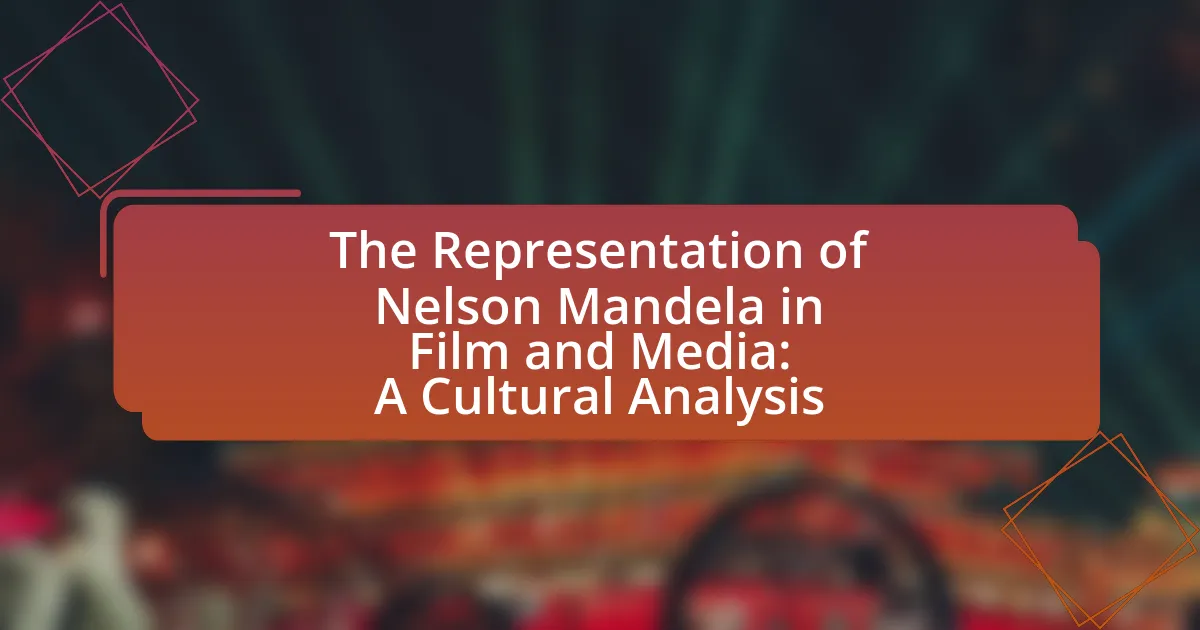The article examines the cultural significance of Nelson Mandela’s speeches in the fight for equality, highlighting their role as powerful tools for mobilization and inspiration during the anti-apartheid movement. It discusses key themes present in his rhetoric, such as justice, reconciliation, and freedom, and how these messages resonated with diverse audiences both locally and globally. The article also explores the historical context surrounding Mandela’s speeches, the impact of media coverage, and the legacy of his words for contemporary activists, emphasizing the importance of empathy, storytelling, and authenticity in promoting social justice.
What is the cultural significance of Mandela’s speeches in the fight for equality?
Mandela’s speeches hold immense cultural significance in the fight for equality as they served as powerful tools for mobilization and inspiration. His addresses, such as the iconic “I Am Prepared to Die” speech delivered during the Rivonia Trial in 1964, articulated the struggle against apartheid and emphasized the importance of justice and human rights. These speeches not only galvanized support within South Africa but also resonated globally, fostering international solidarity against racial oppression. The clarity and moral authority of Mandela’s words helped to shape public opinion and policy, ultimately contributing to the dismantling of apartheid and the establishment of a democratic South Africa.
How did Mandela’s speeches influence the anti-apartheid movement?
Mandela’s speeches significantly influenced the anti-apartheid movement by galvanizing support, inspiring activism, and articulating the struggle for equality. His address during the Rivonia Trial in 1964, where he declared his commitment to the fight against apartheid, resonated globally, drawing attention to the injustices faced by Black South Africans. This speech, along with others like his inaugural address in 1994, emphasized themes of reconciliation and unity, which helped to mobilize both domestic and international support against the apartheid regime. The emotional and moral weight of his words fostered a sense of urgency and solidarity among activists, contributing to the eventual dismantling of apartheid.
What key themes were present in Mandela’s speeches?
Key themes present in Mandela’s speeches include equality, justice, reconciliation, and freedom. Mandela consistently emphasized the importance of equality, advocating for the rights of all individuals regardless of race, as seen in his famous speech during the Rivonia Trial in 1964, where he stated his commitment to fighting for equality. Justice was another central theme, as he called for an end to apartheid and the establishment of a fair legal system. Reconciliation was highlighted in his post-presidency speeches, where he urged South Africans to unite and heal the divisions caused by apartheid. Lastly, the theme of freedom was prevalent, with Mandela often referencing the struggle against oppression and the aspiration for a democratic society, as articulated in his inaugural address in 1994. These themes collectively underscored his vision for a just and equitable South Africa.
How did Mandela’s rhetoric resonate with different audiences?
Mandela’s rhetoric resonated with different audiences by employing inclusive language, emotional appeals, and a focus on shared values. For instance, his speeches often highlighted themes of unity and reconciliation, which appealed to both black South Africans seeking liberation and white South Africans fearing retribution. His famous “I Am Prepared to Die” speech in 1964 articulated the struggle for freedom in a way that garnered international support, emphasizing human rights and justice, which resonated with global audiences. Additionally, Mandela’s use of personal anecdotes and references to African culture connected deeply with local communities, fostering a sense of identity and pride. This multifaceted approach allowed him to effectively communicate with diverse groups, making his message of equality and justice universally relatable.
Why are Mandela’s speeches considered pivotal in promoting equality?
Mandela’s speeches are considered pivotal in promoting equality because they effectively articulated the struggle against apartheid and inspired collective action for justice. His address during the Rivonia Trial in 1964, where he declared, “I have fought against white domination, and I have fought against black domination,” emphasized his commitment to equality for all races. This powerful message resonated globally, mobilizing support for the anti-apartheid movement and highlighting the moral imperative of equality. Furthermore, Mandela’s speeches often included calls for reconciliation and unity, as seen in his inaugural address in 1994, which underscored the importance of building a democratic society based on equality and human rights. These elements of his rhetoric not only galvanized public sentiment but also laid the foundation for a more equitable South Africa.
What historical context surrounded Mandela’s speeches?
Nelson Mandela’s speeches were surrounded by the historical context of apartheid in South Africa, a system of institutionalized racial segregation and discrimination that lasted from 1948 until the early 1990s. During this period, Mandela emerged as a key leader of the African National Congress (ANC), advocating for the rights of the black majority against the oppressive regime. His speeches, particularly during the Rivonia Trial in 1964, articulated the struggle for freedom and equality, emphasizing the need for armed resistance against oppression. The global anti-apartheid movement gained momentum during this time, with Mandela’s words resonating internationally, leading to increased pressure on the South African government. His speeches not only inspired South Africans but also galvanized support worldwide, contributing to the eventual dismantling of apartheid and his election as the first black president in 1994.
How did Mandela’s personal experiences shape his message?
Nelson Mandela’s personal experiences profoundly shaped his message of equality and justice. His 27 years of imprisonment exposed him to the harsh realities of racial oppression, which fueled his commitment to dismantling apartheid and advocating for human rights. Mandela’s time in prison allowed him to reflect on the importance of reconciliation and forgiveness, leading him to emphasize unity over division in his speeches. For instance, his famous address during the Rivonia Trial in 1964 articulated his willingness to sacrifice for the cause of freedom, highlighting his belief in equality as a fundamental human right. This personal journey, marked by suffering and resilience, directly influenced his powerful rhetoric, making it a cornerstone of his legacy in the fight for equality.
What role did Mandela’s speeches play in shaping public perception?
Mandela’s speeches significantly shaped public perception by articulating the struggle against apartheid and promoting a vision of equality and reconciliation. His addresses, such as the famous “I Am Prepared to Die” speech in 1964, highlighted the injustices faced by black South Africans and garnered international sympathy and support for the anti-apartheid movement. These speeches not only mobilized local communities but also influenced global opinion, leading to increased pressure on the South African government. The clarity and moral authority in Mandela’s rhetoric helped to humanize the struggle, making it relatable and urgent to audiences worldwide, thereby transforming public perception of apartheid from a local issue to a global human rights concern.
How did media coverage amplify the impact of his speeches?
Media coverage significantly amplified the impact of Nelson Mandela’s speeches by disseminating his messages to a global audience, thereby increasing awareness and support for the anti-apartheid movement. Major news outlets, including international television networks and newspapers, reported extensively on his speeches, which often highlighted themes of justice, equality, and reconciliation. For instance, Mandela’s address during his release from prison in 1990 was broadcast worldwide, reaching millions and galvanizing international support against apartheid. This extensive media exposure not only elevated his status as a leader but also mobilized public opinion and political pressure, contributing to the eventual dismantling of apartheid in South Africa.
What was the response from the international community to his speeches?
The international community responded positively to Nelson Mandela’s speeches, recognizing them as powerful calls for justice and equality. His speeches garnered widespread acclaim for their eloquence and moral clarity, inspiring global movements against apartheid and racial discrimination. For instance, Mandela’s address during his trial in 1964, where he articulated his vision of a democratic and free society, resonated deeply, leading to increased international pressure on the South African government. This culminated in economic sanctions and diplomatic isolation of South Africa, demonstrating the significant impact of his rhetoric on global opinion and policy.
How did Mandela’s speeches contribute to cultural identity and unity?
Mandela’s speeches significantly contributed to cultural identity and unity by promoting a shared vision of equality and reconciliation among South Africans. His addresses often emphasized the importance of embracing diverse cultural backgrounds, fostering a sense of belonging and collective identity. For instance, in his inaugural address in 1994, Mandela famously stated, “We understand it still that there is no easy walk to freedom,” which resonated with various ethnic groups, uniting them in their struggle against apartheid. This message of inclusivity and hope helped to bridge divides and encouraged a national identity rooted in mutual respect and shared aspirations.
What elements of cultural identity were reflected in Mandela’s speeches?
Nelson Mandela’s speeches reflected elements of cultural identity such as African heritage, unity, and resilience. His references to traditional African values and communalism emphasized the importance of collective identity and solidarity among South Africans. For instance, Mandela often invoked the concept of Ubuntu, which underscores interconnectedness and mutual respect within communities. Additionally, his speeches highlighted the struggle against apartheid as a shared cultural experience, reinforcing a sense of belonging and purpose among diverse ethnic groups in South Africa. This cultural framing was crucial in mobilizing support for the anti-apartheid movement and fostering national pride.
How did Mandela use language to connect with diverse groups?
Nelson Mandela used language strategically to connect with diverse groups by employing inclusive rhetoric, multilingualism, and culturally resonant themes. His speeches often incorporated local languages, such as Xhosa and Afrikaans, which helped him reach various ethnic communities in South Africa. For example, during his inaugural address in 1994, Mandela switched between English and Afrikaans, demonstrating respect for the Afrikaner population while emphasizing unity. Additionally, he utilized universal themes of freedom, justice, and reconciliation, which resonated across different cultural backgrounds, fostering a sense of shared purpose. Mandela’s ability to adapt his language to his audience was crucial in bridging divides and promoting national unity during a time of significant social upheaval.
What symbols and references did Mandela incorporate to foster unity?
Mandela incorporated symbols such as the African National Congress (ANC) flag and references to shared cultural heritage to foster unity among South Africans. The ANC flag, representing the struggle against apartheid, served as a unifying emblem for diverse groups within the nation. Additionally, Mandela often referenced the concept of “Ubuntu,” which emphasizes communal interdependence and humanity, reinforcing the idea that individual well-being is tied to the well-being of the community. These symbols and references were pivotal in promoting a collective identity and encouraging reconciliation among different racial and ethnic groups in post-apartheid South Africa.
In what ways did Mandela’s speeches inspire future generations?
Mandela’s speeches inspired future generations by promoting ideals of equality, justice, and resilience in the face of oppression. His address during the Rivonia Trial in 1964, where he articulated his willingness to sacrifice his life for freedom, resonated deeply, encouraging activism and commitment to social justice among youth globally. Furthermore, his inaugural speech in 1994 emphasized unity and reconciliation, setting a precedent for peaceful transitions in post-colonial societies. These messages have been echoed in movements worldwide, such as Black Lives Matter, demonstrating the lasting impact of his rhetoric on contemporary struggles for equality and human rights.
How have Mandela’s speeches been utilized in educational contexts?
Mandela’s speeches have been utilized in educational contexts to teach values of equality, justice, and human rights. Educators incorporate his speeches into curricula to inspire critical thinking and discussions about social justice, often using specific excerpts to highlight key themes such as resilience and the importance of activism. For instance, his “I Am Prepared to Die” speech is frequently analyzed in classrooms to illustrate the moral and ethical dimensions of the struggle against apartheid, providing students with a historical context that emphasizes the significance of civic engagement and leadership in the fight for equality.
What legacy do Mandela’s speeches leave for contemporary activists?
Mandela’s speeches leave a legacy of resilience and moral clarity for contemporary activists. His ability to articulate the struggle against apartheid and advocate for justice inspired movements worldwide, emphasizing the importance of non-violence and reconciliation. For instance, Mandela’s speech during his trial in 1964, where he declared, “I have fought against white domination, and I have fought against black domination,” highlights his commitment to equality and human rights. This message continues to resonate, encouraging activists to pursue justice through peaceful means while remaining steadfast in their convictions.
What lessons can be learned from Mandela’s speeches in today’s context?
Mandela’s speeches teach the importance of resilience, unity, and the power of forgiveness in today’s context. His emphasis on collective action against oppression highlights the necessity of solidarity in social justice movements, as seen in contemporary protests advocating for racial equality and human rights. For instance, Mandela’s call for reconciliation after apartheid serves as a model for addressing systemic injustices, demonstrating that healing and progress can occur through dialogue rather than division. His speeches also underscore the significance of hope and vision in inspiring change, which remains relevant as communities strive for equity and justice globally.
How can modern leaders apply Mandela’s rhetorical strategies?
Modern leaders can apply Mandela’s rhetorical strategies by utilizing inclusive language, storytelling, and appeals to shared values. Mandela often employed inclusive language to unite diverse groups, fostering a sense of belonging and collective identity, which modern leaders can replicate to bridge divides in their own contexts. Additionally, Mandela’s use of storytelling effectively conveyed complex ideas and emotions, making his messages relatable and memorable; leaders today can harness this technique to engage their audiences more deeply. Furthermore, Mandela frequently appealed to universal values such as justice, equality, and human dignity, which resonated across cultural boundaries; contemporary leaders can adopt this approach to inspire action and solidarity among their followers. These strategies are validated by Mandela’s success in mobilizing support during the anti-apartheid movement, demonstrating their effectiveness in promoting social change and unity.
What techniques did Mandela use to engage and motivate his audience?
Nelson Mandela used storytelling, emotional appeal, and inclusive language to engage and motivate his audience. Storytelling allowed him to connect personal experiences with broader social issues, making his messages relatable and impactful. Emotional appeal was evident in his use of powerful imagery and anecdotes that resonated with the struggles of his listeners, fostering empathy and solidarity. Additionally, Mandela employed inclusive language, often using “we” and “us” to create a sense of unity and collective purpose among diverse groups, which was crucial in rallying support for the anti-apartheid movement. These techniques were instrumental in mobilizing people and sustaining their commitment to the fight for equality.
How can empathy and storytelling enhance speeches for social justice today?
Empathy and storytelling can significantly enhance speeches for social justice today by fostering emotional connections and illustrating complex issues through relatable narratives. When speakers convey personal stories or experiences, they humanize abstract concepts, making them more accessible and impactful for the audience. For instance, research by the Stanford Social Innovation Review indicates that storytelling can increase empathy and engagement, leading to greater support for social justice initiatives. This approach not only captures attention but also motivates action by allowing listeners to see the real-life implications of social injustices, thereby reinforcing the urgency for change.
What are the best practices for delivering impactful speeches on equality?
The best practices for delivering impactful speeches on equality include using personal stories, employing inclusive language, and emphasizing shared values. Personal stories resonate with audiences, making abstract concepts relatable; for instance, Nelson Mandela often shared his experiences to illustrate the struggle for equality. Inclusive language fosters a sense of belonging and unity, which is crucial in discussions about equality. Emphasizing shared values, such as justice and dignity, helps to connect with diverse audiences and reinforces the collective goal of equality. These practices are supported by research indicating that emotional engagement and relatability enhance audience connection and retention of the message.
How can speakers effectively address diverse audiences?
Speakers can effectively address diverse audiences by employing inclusive language and culturally relevant examples. This approach ensures that all audience members feel represented and engaged. For instance, using terminology that resonates across different cultural backgrounds fosters understanding and connection. Research indicates that speakers who adapt their messages to reflect the values and experiences of their audience can enhance engagement and retention, as demonstrated in studies on communication effectiveness in multicultural settings. By acknowledging and respecting cultural differences, speakers can create a more inclusive environment that promotes dialogue and understanding.
What role does authenticity play in delivering a powerful message?
Authenticity is crucial in delivering a powerful message as it fosters trust and connection between the speaker and the audience. When a message is perceived as genuine, it resonates more deeply, encouraging engagement and emotional response. For instance, Nelson Mandela’s speeches often reflected his personal experiences and values, which enhanced their impact and credibility. Research indicates that audiences are more likely to be influenced by speakers who exhibit authenticity, as demonstrated in studies on persuasive communication, such as those by G. R. McCroskey and J. C. McCroskey, which highlight the correlation between perceived authenticity and audience persuasion.


